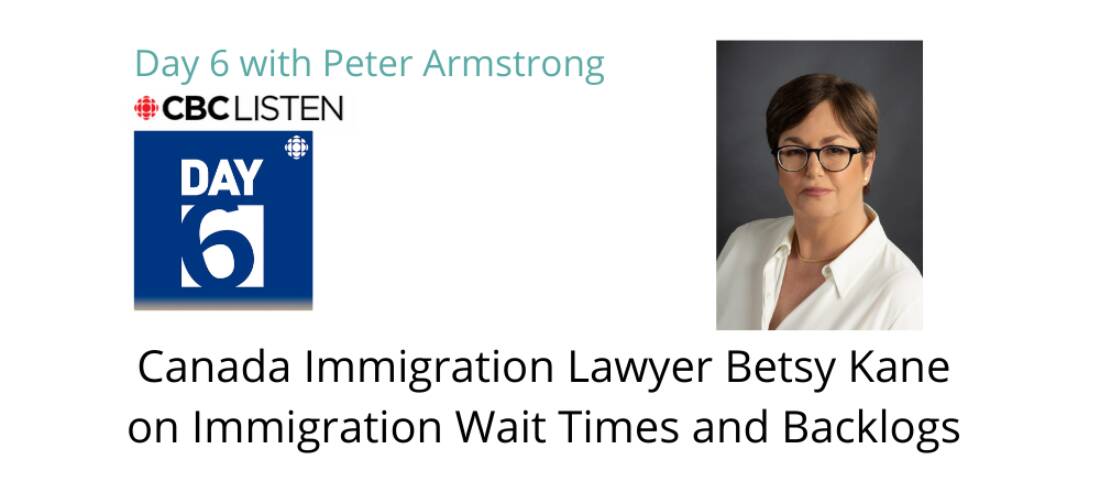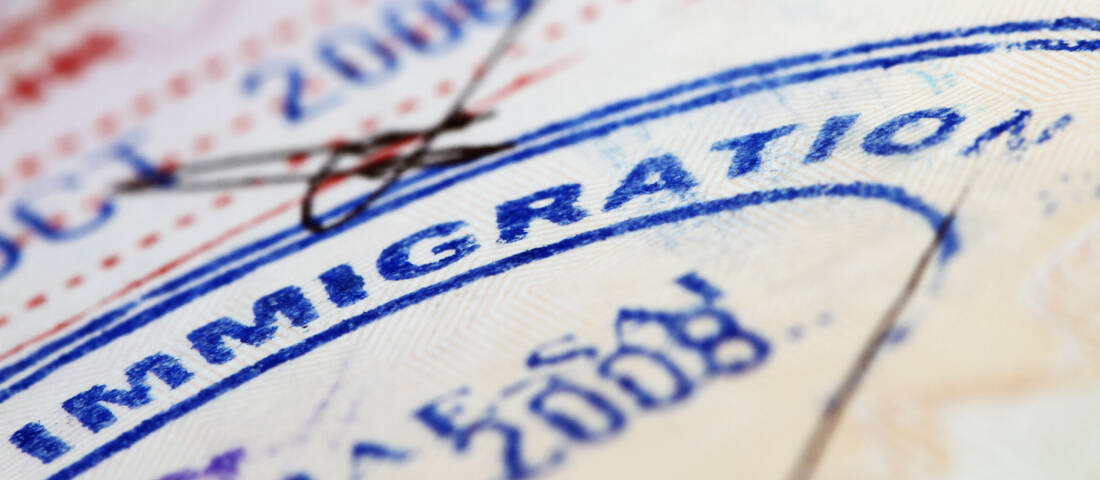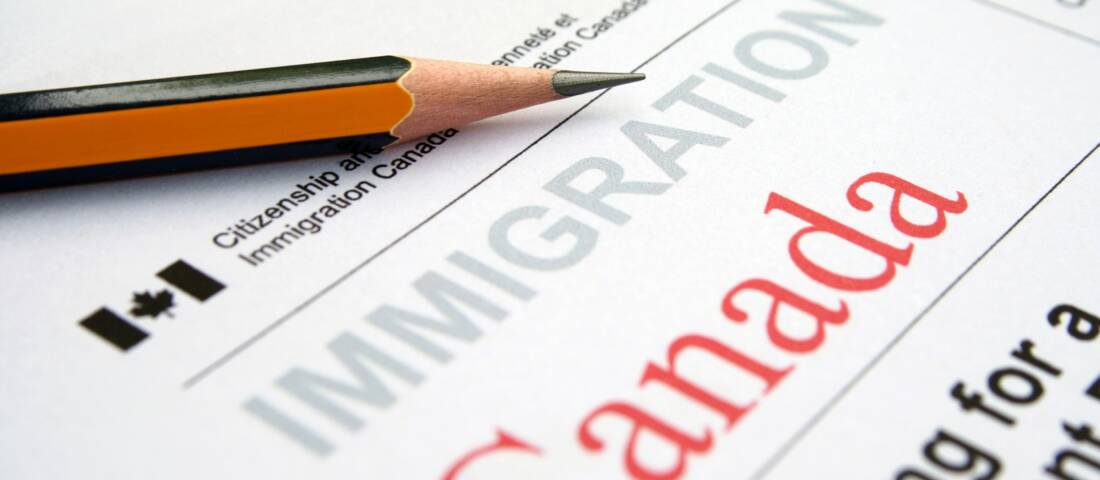Canada immigration lawyer Betsy Kane spoke to CBC Radio correspondent Peter Armstrong on Day 6 about immigration wait times. According to Immigration, Refugees and Citizenship Canada, there is a backlog of about 1.8 million immigration applications. Betsy Kane told Day 6 on March 5 that immigration backlogs have always been a problem, but the pandemic has made the situation worse at a time when Canadian businesses are struggling to fill jobs in a tight labour market. Betsy Kane on the steering committee for the Canadian Immigration Lawyers Association.
Here are some takeaways from their conversation on Canada's immigration wait time:
- Canada currently has about 1.8 million cases in application backlogs.
- Immigration lawyer Betsy Kane says the government needs to make immigration an essential service during the pandemic.
- Because of the pandemic, IRCC contracted third-party contractors to open and manage applications and other mail so IRCC workers could work from home.
- Many applications were sent back where they were perfect or had such minor clerical errors or minor issues that did not warrant sending back eight to nine months after they were filed.
- The immigration online status systems are not current and do not provide sufficient information to check on case status.
- If Canada Border Systems Agency was an essential service and worked during the pandemic, why isn't IRCC also an essential service?
- Canada has a serious labour shortage, and there are skilled foreigners who are trying to move to Canada, but their applications are delayed, lost or in the backlog.
- Immigration is key to Canada's financial stability. Canada needs immigrants to sustain our economy, to sustain our tax base, to allow for the baby boomers to retire and get a pension.
--> Listen To the Full Broadcast Here:
https://www.cbc.ca/listen/live...
Book A Consultation
Discuss Your Situate With An Immigration Lawyer
Don't let immigration wait times and the backlog derail your plans to move to Canada! An immigration lawyer can review your qualifications and help identify immigration opportunities that fit your education, skills and specific situation. An experienced immigration lawyer can save you time and stress - and prevent costly mistakes and missed deadlines.
Ackah Business Immigration Law's team of immigration professionals identifies and resolves potential problems BEFORE they happen. Contact Ackah Business Immigration Law today to discuss your situation at 403-452‑9515.
Transcript: Immigration wait times were already long. COVID-19 made them worse
Marc Harron:
I would say it was probably about two years ago. We vacationed here in Vancouver. We have some friends that live here. So, we decided to move here. It just took a while for us to get the arrangements made for us to move. Finding a job for Liz, selling our house, getting rid of a bunch of stuff so we could afford to move here to Canada.
Peter Armstrong:
That's Marc Harron. He's a high school teacher from St. Cloud, Minnesota. He, his wife Liz, and their son Chris crossed the border from the US last spring with hopes of creating a new life in Surrey, BC. Liz is Canadian, so they figured that immigrating to Canada shouldn't be too hard.
Marc Harron:
Yeah. I applied May or early June. And, then we heard back in August that they had received it. But, we hadn't heard anything else other than that until December when it got sent back because of no mistakes on my part, it was just a failure of the person who was looking at my application to actually look at the information that was provided and make the determination that it was correct.
Peter Armstrong:
So, Marc forked over 350 bucks to an immigration consultant to have a look at his file. He sent it back with an explanation that he'd done nothing wrong, and then more waiting. And meanwhile, his family's life was pretty much on hold.
Marc Harron:
My son Christopher has applied for his citizenship certification. But, then we looked on the website and it said the wait time was 15 months. Which is 15 months that my son who is a Canadian citizen does not have access to healthcare. He can't have a job, can't pay taxes, can't go to school. He's just here living in our home. He can't do anything.
Peter Armstrong:
While Marc and Chris are unable to work, Liz, who's a registered nurse, has been working overtime, supporting the family.
Marc Harron:
My wife is really happy here. She loves her job. She loves the people she works with. We do have friends here. Our one-year lease is set to expire in April, and then we're going to go month to month. If my application gets rejected again, I think that's when we'll make the decision to cross the border again and go back to the States because they're hurting just as bad for nurses in the States as they are here.
Peter Armstrong:
The Harron family story will be familiar to a lot of people who have Canadian immigration applications pending. According to the Immigration Department, Canada currently has about 1.8 million cases in application backlogs. Betsy Kane is part of the Steering Committee at the Canadian Immigration Lawyers Association. She says the government needs to make immigration an essential service during the pandemic. Betsy, good morning. Welcome to Day 6.
Betsy Kane:
Thank you for having me.
Peter Armstrong:
So, we heard from the Harron family about their application nightmare. How often do you hear stories like this?
Betsy Kane:
Well, what I can tell you is that I'm actively involved with different list serves of the bar and lawyers across Canada. And, this is a weekly occurrence, even when the applications are filed in conformance with the checklists.
Peter Armstrong:
I mean, one of those things that you bring up in conformance with the checklist, they get sent back saying, "Oh no, there were mistakes." And, then a consultant looks through and says, "There are no mistakes here." That sounds like... I keep hearing that over and over again.
Betsy Kane:
Yeah. So, what lawyers do is they will scan the exact file of back to front, including envelopes and backs of photos. And, so the IRCC will come back and say, "You were missing your photos" or "You're missing your police check." And, it's there at page 156 in original format and green paper so there's no way it could have been missed. But, the problem is that because of the pandemic, IRCC had contracted third-party contractors to come into their processing sent to basically unbundle, unpackage applications and scan them for IRCC officers to enable them to continue to work at home.
Betsy Kane:
And, these are not trained immigration mail room individuals, and there's a lot of applications that got sent back where they were perfect and there were applications where there were such minor clerical errors or minor issues that did not warrant sending back an application eight to nine months after they were filed. I find that totally unconscionable. And, so many lawyers and applicants themselves are just scratching their heads. It's been trying and professionally demoralizing.
Peter Armstrong:
For you. And I can't imagine what this is like for the families. It must be so frustrating as they wait and wait and then another setback.
Betsy Kane:
Yeah, it is. And, I've dealt over... Since the pandemic, I have dealt with applications with families where they've had to submit three applications to get it in process and took a year to get it in process. And, this is what I guess has enraged the public and made them come, as you can see, there's a lot of people who have taken to social media to vent their frustrations.
Peter Armstrong:
You know, making the system work at the best of times is hard and requires everybody rowing in the same direction and doing their job effectively. From MPs in Ottawa all the way down to bureaucrats, wherever they may be with that in mind, what's the domino effect that this backlog has on just kind of the rest of the whole system?
Betsy Kane:
Well, the domino effect is for members of parliament, as you know, most members of parliament, particularly in the metropolitan regions are inundated. And, most of their staff deal with constituents who need status requests on their application. And, even from my limited experience in working with MPs, I mean, they have immigration specialists in their office trying to leverage the communication systems and part of the backlog, one of areas of the backlog is that people can't even get their MPs to get the information from IRCC. So, they're making access to information requests, which is further bogging down the system, because it's the only way that they can get the information as to what is happening on their file because the online status systems are just not current or provide sufficient information.
Betsy Kane:
So, there's a lot of fallout and you know, it's the most frustrating as a professional in this is having to tell clients for the first time in my career, "I'm sorry, I don't know what is happening. I don't know how to get more information. I know the application is in process." And you know, I can go on the hamster wheel and chase MPs and do access requests, but there's nothing more I can do. My hands are tied too. And, that's not a type of advice that anybody likes to give.
Peter Armstrong:
Oh, that must be just so incredibly hard. One of the things that you've suggested at least in the past has been that immigration services should be considered an essential service, at least during the pandemic, how would that actually help?
Betsy Kane:
It would absolutely help. It doesn't make sense to us. You need immigrants. You have a robust plan to bring over 400,000 people a year. You have people begging and pleading for their visas and who has taken the brunt of this during the whole pandemic? Has been the Canada Border Services Agency. They've been on the line too, 24/7. They are an essential service because they're monitoring our airports, our land borders and marine crossings. They are basically managing quite a bit of the immigration intake, particularly over the pandemic. They were able to go to work and why can't IRCC? Why can't the processing centers operate on a 24/7 shift and find other locations, whether they're warehouses or some other facilities where people can work in a distance environment to open these packages, vet them properly, scan them as they need to. I mean, we need these people working 24/7 and back to work.
Peter Armstrong:
Betsy, I've written stories on these issues pre-pandemic and again, through the pandemic. And, I keep coming up on Canadians who (a) don't know the system and its troubles (b) are too busy with other things to pay attention. Maybe think they don't even care about this. Walk me through why this matters and what's at stake here.
Betsy Kane:
Well, why it matters is because we don't have sufficient birth rate to populate our country and to keep the labour market buoyant. We all pretty much, I don't know of any sector that doesn't have labour market challenges. And, the whole premise of the immigration levels plan has been to support the growth and of the labour market, which is short across so many sectors, whether it's IT, manufacturing, construction, restaurants, transportation, I mean it's everywhere. So, we need these immigrants to sustain our economy, to sustain our tax base, to allow for the baby boomers to retire and get a pension. Immigration is key to our financial stability. Our global competitiveness. Our ability to innovate. Our level of healthcare. We need more doctors, nurses, PWS, respirologists all of this just to have a functioning healthcare system.
Peter Armstrong:
Well, listen, this is hugely important stuff and we sure are glad to get you on the program today. Thanks for this.
Betsy Kane:
Thank you, Peter, for having me.
Peter Armstrong:
Betsy Kane is an immigration lawyer and sits on the steering committee for the Canadian Immigration Lawyers Association. We asked for a response from Immigration Refugee Citizenship Canada but did not receive one by our deadline.








